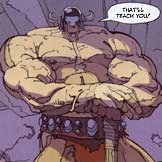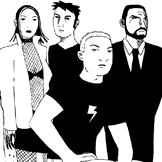Not every comic creator decides to take the route of working for a big comic company. Many self-publish their work instead, for a variety of reasons. These range from the creative freedom and control self-publishing offers, through the lack of deadlines and bureacracy to a desire to get noticed by the big companies. Here's what some self-published comics creators had to say about doing it for yourself.
 Carl Critchlow, Thrud the Barbarian
Carl Critchlow, Thrud the Barbarian There were a couple of reasons for self-publishing Thrud. It had run its course in White Dwarf [the Games Workshop magazine], but every time I went to a role-playing show, someone would come up and go, "Ah, you're the bloke who did Thrud - what happened to that?" So there was a bit of an interest bubbling under.
At the same time, I'd worked out a completely new way of working, on the computer, but I knew that no-one would be interested in the style. As an artist, I'd been put in the "painted artwork" box, and this was very different.
So, by self publishing, I could go in a new direction, and it was a way to get noticed. With the computer, I could have a go myself, and do the whole thing - writing, drawing, colouring and lettering - and just give a disk to the publisher. At the moment I just break even, distributing it through comic shops and the Thrud website at
http://www.thrudthebarbarian.com. I've got a short term plan, though, of doing four issues, collecting them in a trade paperback, and trying to break into the overseas market. Then maybe I'll make some money from it!
 Martin Eden, The O Men
Martin Eden, The O Men
I�ve been drawing since I could hold a pencil � and up until I was about 20 years old, only my family had seen my comics. So then I decided to try drawing from other people�s scripts, and get my stuff seen, and I just loved the first comic I had �self-published�. I loved the format, and the feedback from readers was very encouraging.
After that, I decided to go ahead with a comic I�d had in my head for a long, long time � The O Men, a superhero soap opera. I started it five years ago, and it�s still going strong. There�s absolutely no money in it, but that�s not why I do it. It�s just great to get a letter off a reader who�s really enjoyed the comic. Connecting with someone in that way makes it all worthwhile. And even if they have criticisms, they are often constructive and you can learn things about your writing/drawing. I�ve also been nominated for several awards, which is cool, and I get great reviews � mostly 8 or 9 out of 10.
At the moment, I�m working on the final three issues of volume one � it�ll be so weird to finish it after all this time � but then there will be volumes two and three! Plus, I�m working on an O Men anthology, where different self-publishing writers/artists will be contributing stories about my characters.
I go to a lot of comics shows these days, and people often ask how to go about publishing their own comic. I say go for it! It can be a real buzz � though a lot of hard work. But at the end of the day, all you need to get it printed is a photocopier.
I started out photocopying my O Men at work (with permission!) but then it just got ridiculous � I had quite a few orders and I never had enough time. So now I get it printed at a local copy shop � they do a much nicer job, and it only costs about sixty quid for 100 copies. Plus, sometimes if you build up a good working relationship with the staff they do cool things � like once they wanted to try out their new machine so they used one of my issues to do it. It ended up on beautiful, glossy paper and they charged me the usual sixty quid for what should have cost me over £1000!!! After that, I advertise it in comic publications, and on my website at
http://www.theomen.free-online.co.uk/and sit back and wait for orders to come in. Good reviews always help with things like this � and word of mouth, so going to comic shows/festivals is essential if you're really serious.
 Roger Langridge, Fred the Clown
Roger Langridge, Fred the Clown
I initially started doing Fred the Clown as a web comic, one strip a week. It was a way to keep myself productive during a particularly lean period in my cartooning career - the idea was that I'd commit myself in public to doing a new strip every week and then I'd look a proper fool if I didn't deliver.
After about a year of doing the web strip, it occurred to me that I had enough strips to collect them into a comic book and possibly get it published. I tried to find a publisher but to no avail - partly because I suppose it was a little offbeat, and partly because the kind of publishers who would once have been keen to publish it were now moving more into the book market and away from the 32-page serial pamphlet format.
Eventually I realised that the only way I was going to get it published (I was convinced, and still am, that it was my best work to date) was to do it myself. As it turned out, it was exactly the right thing to do; it put me "back on the map", as it were, and the comic got nominated for two Eisner Awards and an Ignatz Award... and now it's going to be published by Fantagraphics Books, one of the companies who originally rejected it, as a paperback for the bookstore market.
I'm currently taking a break from self-publishing because I have a one-year-old daughter taking up all my spare time and also because I'm broke (self-publishing is at best a break-even proposition). I hope to return to it when she's a bit older and my finances are in better shape. It's still the best way to make sure something in your head reaches its intended audience in its purest form.
The BBC is not responsible for the content of external sites.


